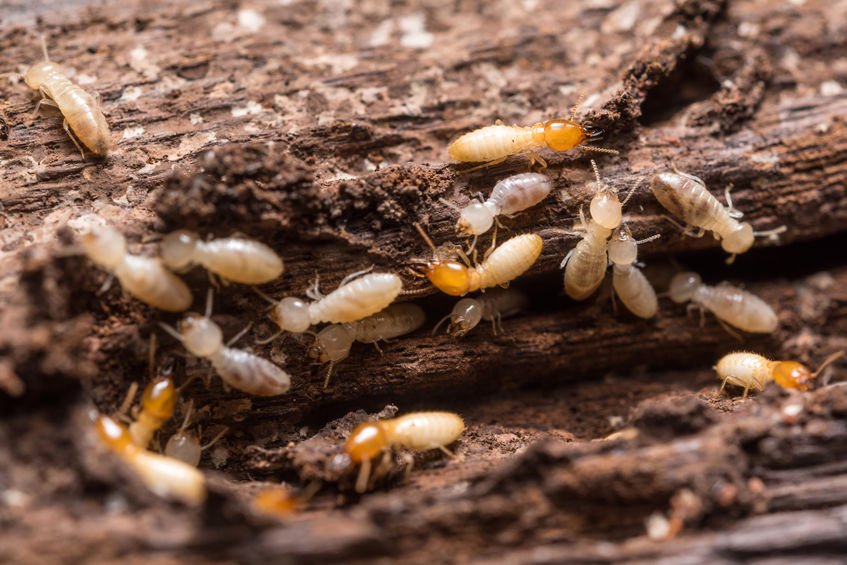
The Ultimate Guide To Termite Inspections
What questions will this article answer?
How often do I need a termite inspection?
Government guidelines recommend that a termite inspection should be carried out at least once a year, depending on your property’s risk of termite activity.
How do you prepare for a termite inspection?
Allowing your termite inspector access to more of your property means that they can provide you with a more thorough assessment. For better access, you can move furniture away from walls, clear away items in wet areas, enable easy access to entry and exit points, and trim overgrown vegetation around the house.
How are termites detected?
A termite inspector will visually inspect your property to check for building damage, mud tubes, and ingress points. We may use specialised equipment such as borescopes, sounding tools, moisture meters and movement detectors. Once we’ve finished, we’ll send you an inspection report with our findings, recommendations and a proposed treatment plan if required.
What happens during a termite inspection?
A fully licensed and experienced termite inspector will use termite detecting equipment to perform a physical inspection of your property. The inspection should include inside rooms, roof voids, outbuildings, on floors and subfloors, around your yard and along the outside walls.
How will I know if I have termites?
You’ll notice damage to walls, floors and ceilings, and a hollow sound when you knock. Your electricity may short circuit often, and there may be flying termite swarms, discarded wings, or mud tubes.
How much does a termite inspection cost?
Our termite inspections start at $198, though the exact price depends on the size of your home, the extent of the inspection and the need for additional equipment.
How do you treat a termite outbreak?
We’ll propose a customised treatment plan using termiticides such as Premise Treated Zones and Sentricon® Always Active™ and make recommendations for general maintenance, which can help prevent future outbreaks.
Will I need a termite inspection if I live in a new home?
Annual inspections are necessary according to government guidelines. Unfortunately, no termite barrier is completely guaranteed to keep termites away, whether your house is new or old. You’re also more at risk of a termite attack if you live in a hot and humid climate, have neighbours with termites, water leaks, previous outbreaks, or recent landscaping changes.
How can you safeguard your home (and wallet!) from a termite attack?
Annual inspections by our fully licensed termite inspectors will keep you and your family safe from an expensive and destructive termite attack. We are available 24/7 for emergency call outs, offer payment plans so everyone can afford to stay protected, and offer a 100% money-back satisfaction guarantee for our services.
Around one in five Adelaide homes have experienced a termite outbreak, with treatment and repair bills averaging $10,000. So to prevent an outbreak and keep you and your family safe, it’s essential to take preventative measures.
Many newer homes are equipped with termite barriers for prevention. But unfortunately, there is still no guarantee of permanent protection even with these barriers. Your best line of defence is to undergo annual comprehensive termite inspections by licensed, experienced professionals who are highly trained to detect early signs of a termite problem.
If you have seen termites on your property, are concerned about an outbreak, or are due for an annual inspection, this guide to Adelaide termite inspections contains everything you need to know. Read on to find out more.
How often do I need a termite inspection?
According to government guidelines, it’s recommended to have termite inspections at least once a year, depending on your home’s risk level.
Termites are known to cause extensive and costly problems to homes and businesses. It’s estimated that one in five Adelaide homes have fallen victim to termite destruction, and the average cost of treating and repairing the damage is around $10,000 (according to the AEPMA).
What’s worse is that termite damage is considered preventable, so it’s not covered by home and contents insurance. This makes it well worth the long term investment to take precautions against termite infestationw, especially when the cost of an inspection is comparatively low, at around $200.
Don’t leave your annual termite inspection too late!
Make an appointment today
 or
or
Preparing for a termite inspection
Improving accessibility helps your termite inspector provide a thorough assessment and makes it easier to detect the earliest signs of a termite attack. Here are some ways to ensure that you get the most out of your inspection:
- Enable easy access to entry and exit points such as garage doors, roof void, basements/subfloors, attics
- Move furniture away from walls for easier testing of moisture levels and sounds
- Clear away items located in wet areas, around and underneath sinks, pipes in kitchens and bathrooms
- Trim back overgrown vegetation such as branches to enable easier access to exterior walls
- Store firewood and timber away from your house and in a dry environment
How termites are detected
A licensed and trained Allstate termite inspector will attend your property to conduct a comprehensive, professional assessment for termites in compliance with Australian Standards. We’ll record our findings and present them to you in an easy to understand report.
Physical inspection
A termite inspector will begin with a visual examination of your property to check for damage to walls, ceilings and floors and the presence of mud tubes and ingress points. As termites are usually hard to see and hear, we’ll bring along specialised equipment to help identify subtle signs of an outbreak. This includes borescopes, sounding tools, moisture meters and movement detectors.
Inspection report
Following the inspection, we’ll discuss our findings with you and prepare a formal document for your reference. This will include all observations, results, photos, and recommendations for treatment if needed.
What happens during a termite inspection?
Without proper training, it’s easy to miss early signs or mistake termites for another problem altogether.
Our highly trained termite inspectors follow an inspection protocol that ensures every area is checked carefully. We are fully equipped with devices that assist with accurate termite detection and estimating the extent of an outbreak.
Termite detecting equipment
- Borescopes are specialised optical devices that are used to photograph active termites inside timber structures.
- Sounding tools are tapped against wooden structures to assess their integrity.
- Moisture meters are used to locate areas of high moisture that attract termites, including inside rafters, joists, and sills.
- Movement detectors using an infrared sensor helps us detect active termites behind walls, in ceilings, and beneath floors.
Physical inspection of your property
To make sure that nothing is missed, we follow a general inspection procedure that allows for variations in property layouts. You can expect us to cover these termite hotspots:
- Interior rooms are assessed using a moisture meter, sounding tool and screwdriver. This covers wall, ceiling and floor surfaces, door frames, skirting boards and cupboards.
- Timber beams in roof voids can be checked with a sounding tool and screwdriver.
- Subfloors are a common entry point for termites, so we pay extra attention to this area. We may try to gain access by carving a trap into the floor, or, if this is not possible, we’ll use a borescope to inspect for signs of termites.
- An exterior property inspection around the entire perimeter of your house is conducted using a sounding tool and screwdriver.
- All interior and exterior sections of any outbuildings are inspected with a sounding tool and screwdriver.
- The grounds surrounding the building are carefully assessed, including the garden beds, landscaping timbers, trees, stumps and along the fence line.
How will I know if I have termites?
Changes to walls, floors and ceilings
- You notice cracks in your walls, floors and ceilings which can be mistaken for water damage.
- The paint on your walls may appear to have a “bubbling” or “honeycomb” appearance due to termites destroying the timber underneath.
- You may gradually see cracks, blisters and sagging to surfaces like laminated floors, ceiling beams and skirting boards.
- Warping of doors and frames can make doors and windows hard to open due to moisture filling the timber cavities left by termite destruction.
Mud tubes
Termites make tunnels from dirt, wood, debris, and droppings to protect them when they forage for food away from their underground nests. You should keep the perimeter of your house clear of moist soil and dirt to discourage termite activity.
Hollow sounds when knocking on timber structures
If you knock your walls and hear a hollow, echoing sound, this may indicate that termites have tunnelled through the insulation to eat away the wood.
Clicking sounds can indicate termites eating away at the wood or soldier termites banging their heads against the wood to signal a threat to the colony.
Flying termite swarms and discarded wings
Every three to five years, a colony will send winged termites or swarmers to start a new colony elsewhere. If you notice white flying insects or piles of wings around your property, near lights or windowsills, particularly during spring and summer, you may have an outbreak of swarmers. They nest in woodpiles and tree stumps, so it’s recommended to clear your yard.
Short-circuiting power
Electrical wiring in walls, floors and ceilings are all susceptible to termite damage. If you experience electricity interruptions more often than usual, check for mud tubes or a build-up of organic material around your electrical fittings. Remember to take extra care when handling high voltage electricity fixtures.
Noticing signs of a potential termite attack? Act fast!
Organise an urgent inspection today
 or
or
How much does a Termite Inspection cost?
At Allstate, we offer termite inspections from $198. This figure can vary depending on the size of your home or property, the extent of the inspection and whether additional equipment is required to improve accessibility or detection.
If I live in a new home, will I need a termite inspection?
Hot and humid climates
For a significant part of the year, most areas in Australia, including Adelaide, have favourable weather conditions, which pose a high risk for termite infestations.
Neighbours with termites
If adjoining properties have confirmed outbreaks, termites may have also spread to your property, as they’re able to travel 50 to 100 metres away from their nest. If your neighbours have termites, we recommend that you conduct a property inspection just in case.
Water leaks
If you live in a high moisture, damp climate, or you’ve had a plumbing issue with water leakage, you may have attracted termites. In this case, you may require more frequent inspections.
Previous termite infestation
If there has been a previous outbreak in your area, this could mean that termites were able to penetrate any previous barriers that were installed.
Landscaping
Changes to your yard can compromise your existing termite barrier and offer termites new entry points to your property and home.
Termite inspections before purchasing a home
For extra protection against termites, particularly if you live in a high-risk area, Allstate can conduct pest inspections before you commit to buying your dream home.
We’ll let you know if we detect any termites or if the house has other risk factors that may pre-dispose your new place to a termite outbreak, such as dampness.
How to treat a termite outbreak?
We’ll provide you with all the information you need to know about preventing the termites in your inspection report.
Depending on the severity of your outbreak and the layout of your home, we’ll propose a customised treatment plan using a range of different types of termiticides and offer tips on preventing future outbreaks.
Premise Treated Zones
Premise is a non-repellent termiticide that causes termites to become confused and disoriented, lowering their defence mechanisms. This makes them vulnerable to deadly diseases from fungi and soil micro-organisms. By placing Premise in specific areas, known as treated zones, strategically around your property, more termites will interact with the product. While Premise is toxic to termites, it is safe for humans, the environment and other wildlife.
Sentricon® Always Active™
This product contains in-ground termiticide coated rods designed to attract termites then disrupt their growth and development by inhibiting the moulting process. By positioning a Sentricon® station in prime termite foraging areas, termites carry the termiticide back to the nest, so it spreads through the entire colony. This offers powerful protection against termite infestations by preventing them from happening in the first place.
Reduce your risk of attracting termites
- Garden and yard maintenance is important. Store piles of wood and timber away from your house in a dry place, remove tree stumps and clear away piles of vegetation and litter.
- Ensure wooden furniture in the home is sealed, treated and moisture-free.
- Repair sources of leaks as quickly as possible, including pipes, drains and roof damage.
For safe and effective termite control,
speak to a termite technician today
 or
or
Safeguard your home (and wallet) from a termite attack
To help keep you and your family safe, our team of fully licensed and experienced termite inspectors have extensive knowledge of termite behaviour and adhere to Australian Standards. We are highly trained to use specialised equipment to detect even the most subtle signs of a termite outbreak. Once your inspection is completed, we’ll send you a report of the findings and, if necessary, recommendations for treatment.
We use strategically placed, targeted, high-quality treatments such as Premise Treated Zones and Sentricon® Always Active™, which are safe for people, pets and the environment.
We offer highly responsive services to inspect and treat termite infestations, and regular inspections are conducted with minimal disruption at a time that suits you. To ensure peace of mind that you and your family always stay protected, we offer payment plans and a 100% money-back guarantee if you’re not satisfied with our service.
If you need to schedule a termite inspection, or have concerns about termites on your property, speak to an Allstate consultant today.

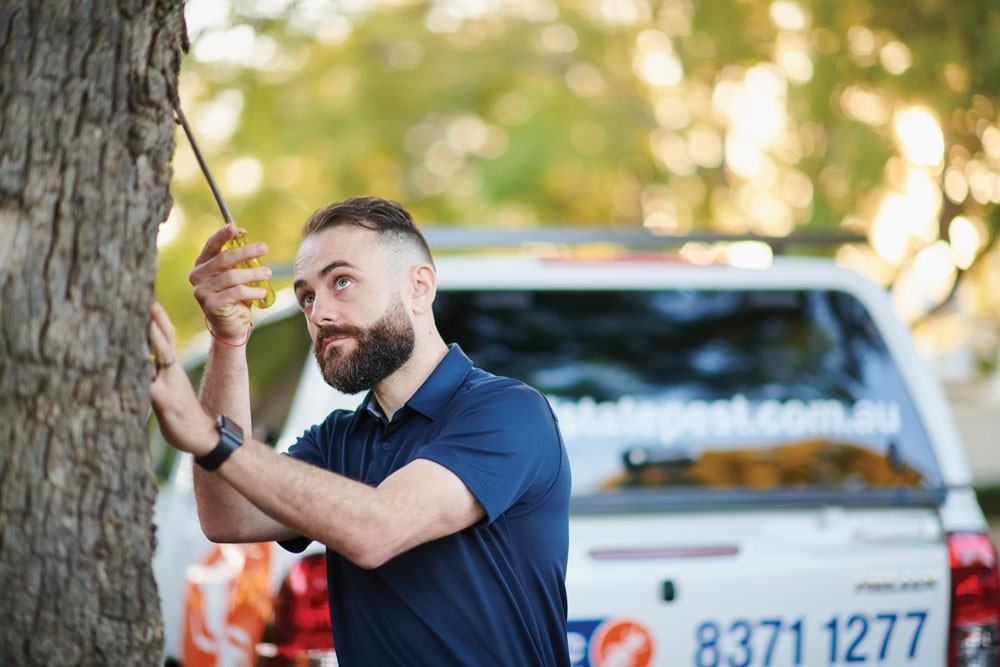
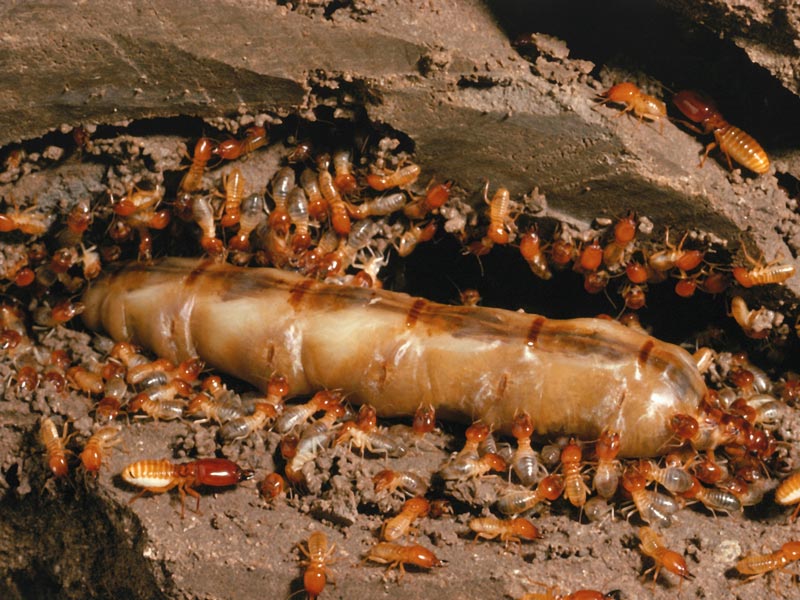
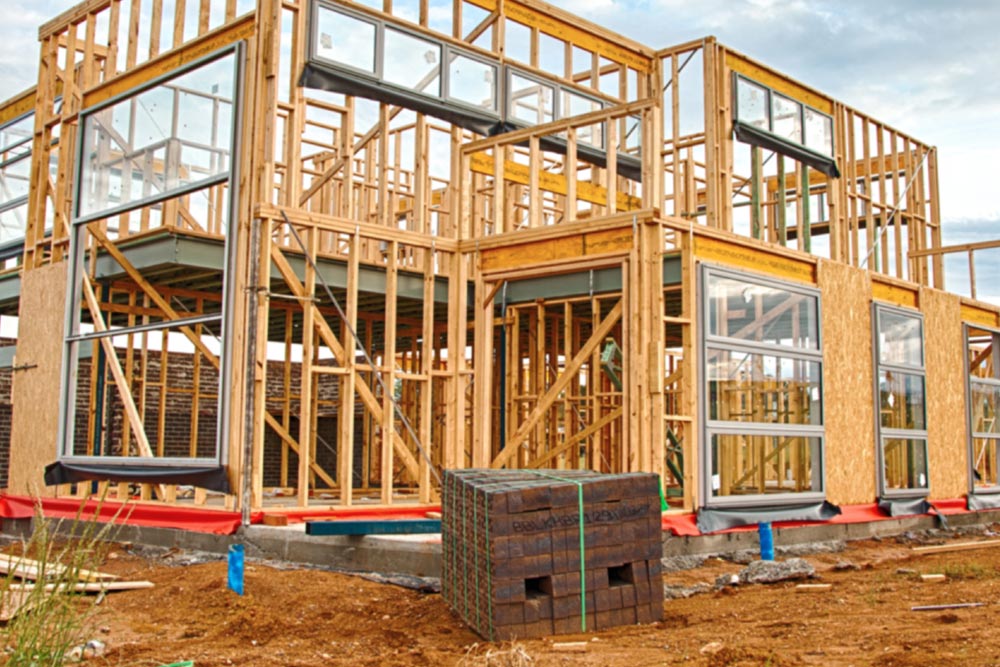
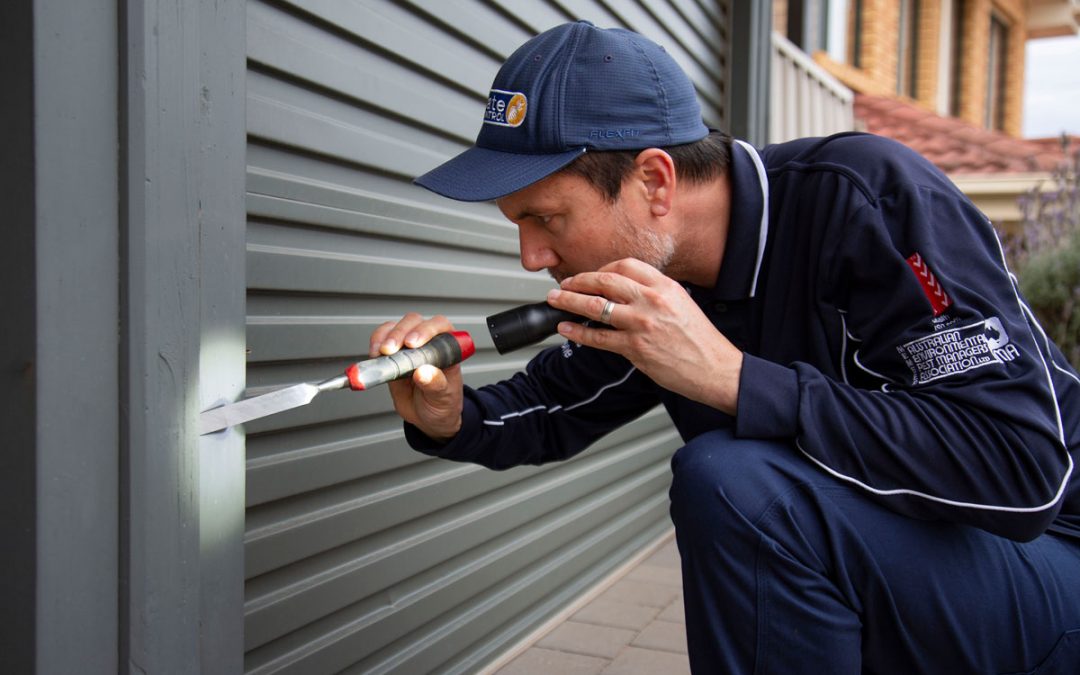
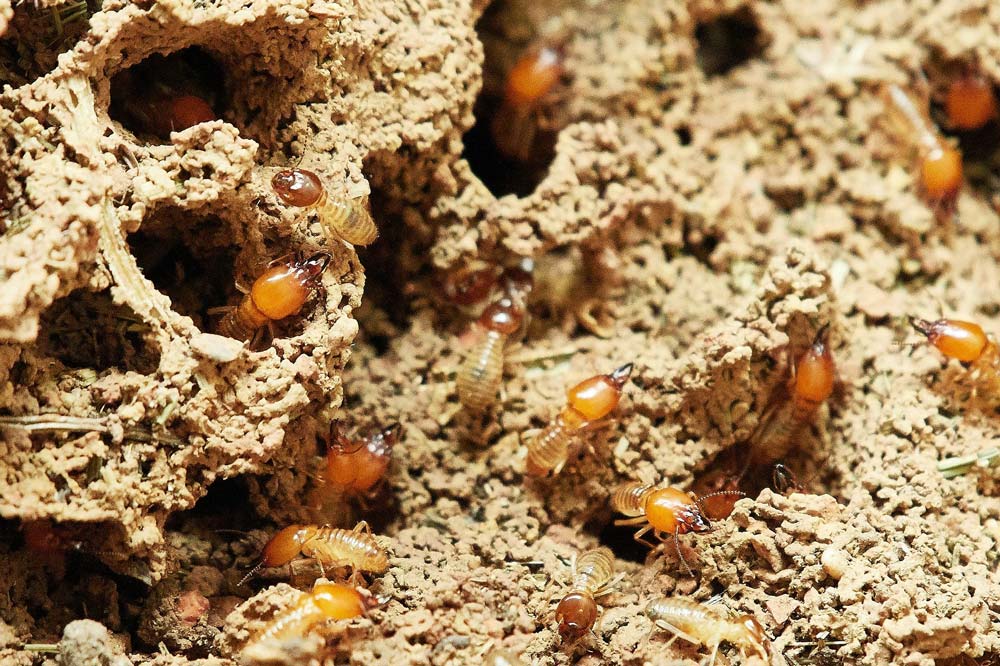
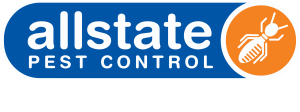


Recent Comments